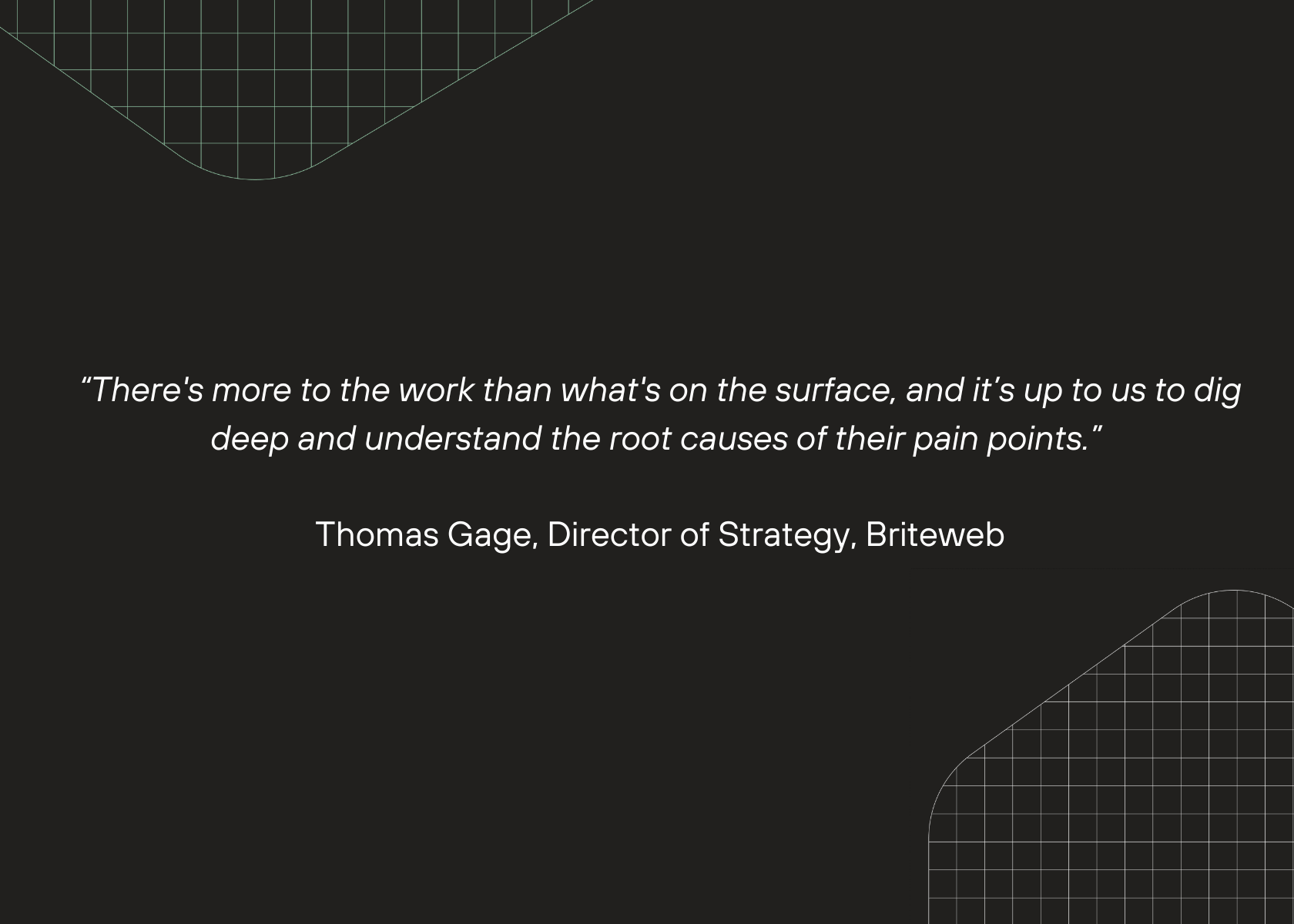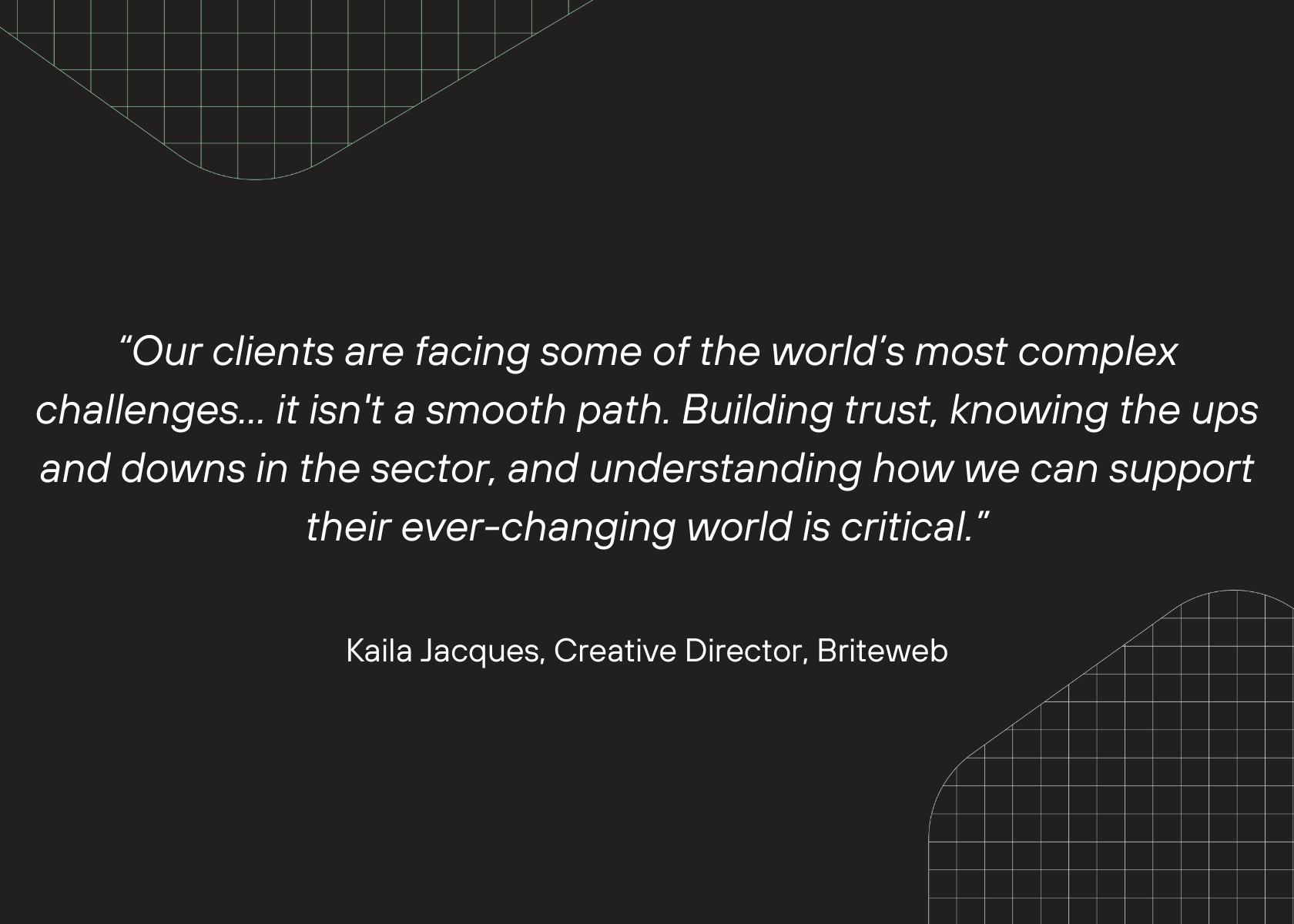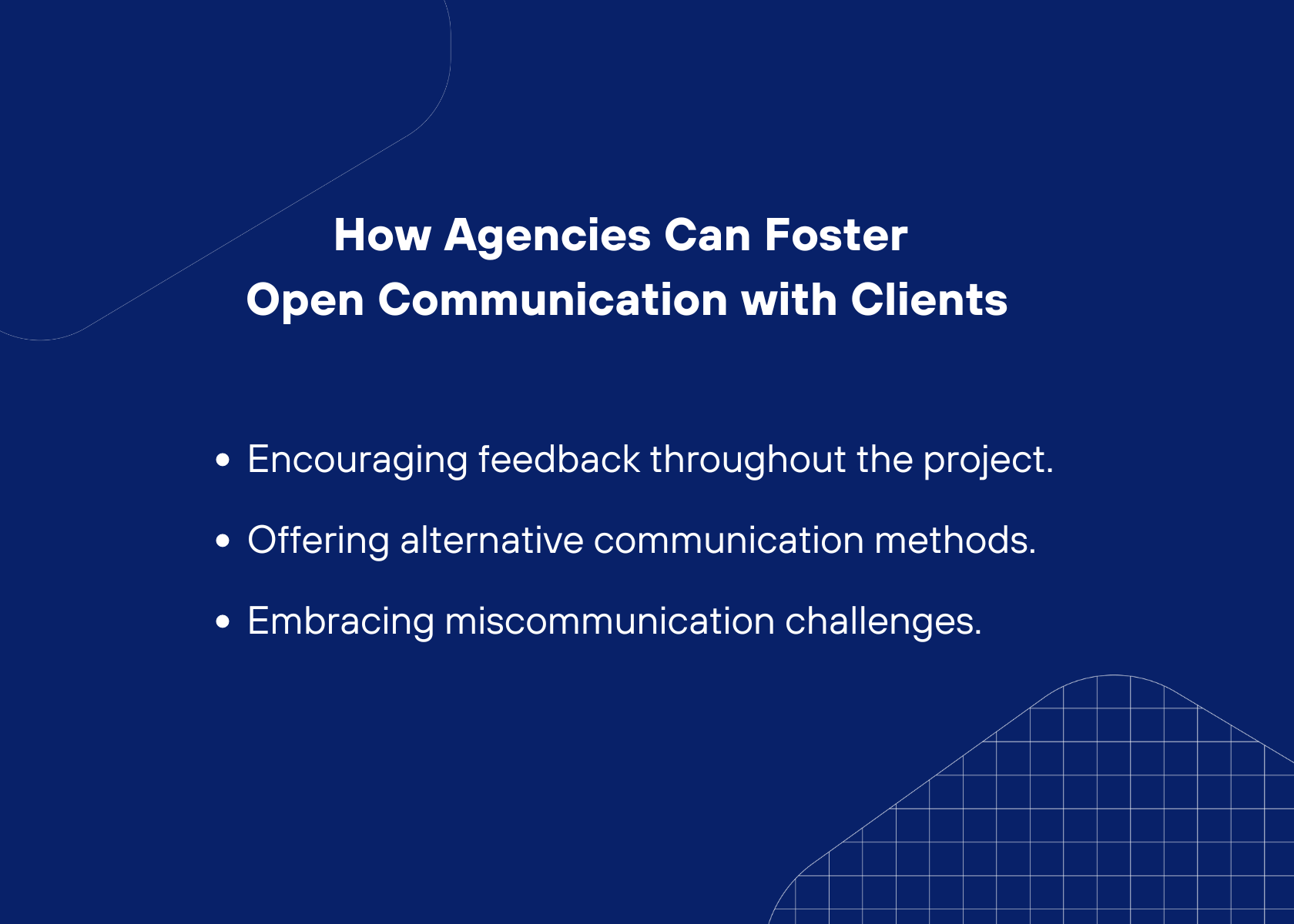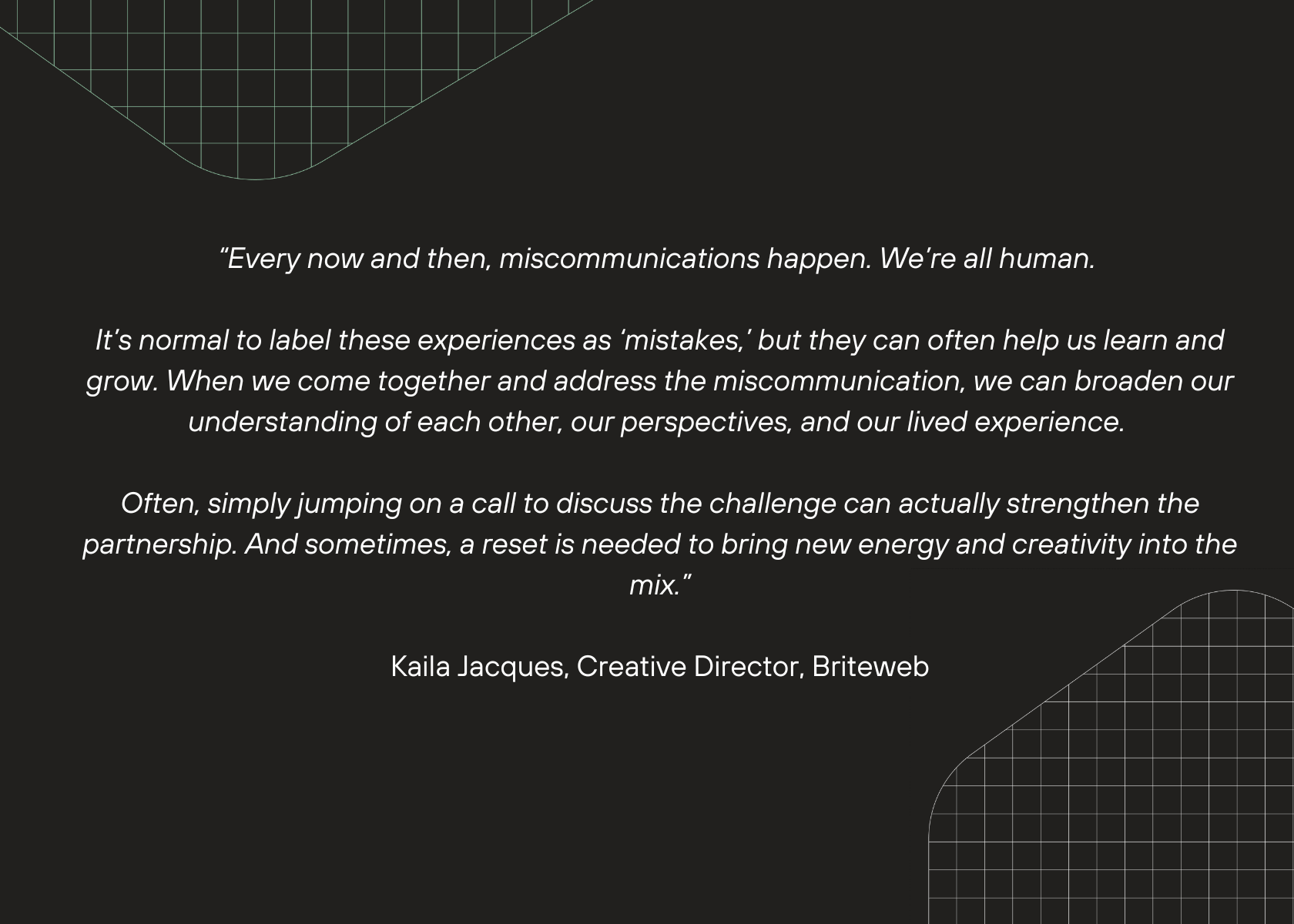With thousands of creative agencies out there, it’s tough to know which one to choose—especially if you’re in the world of social impact.
But if you like an agency’s work and their values align with yours, the next best step is often an underrated, and much more basic, one: seeing how well they collaborate.
Because honestly, the success of any agency-client project all comes down to collaboration. It determines what the process will be like and how well you’ll work together. If their approach aligns with yours, you may have found your match.
But what are the factors, really, that make agency-client collaboration successful? Here are key factors to look for.
If They Really Listen
At the start of any new project, it’s crucial that your agency gathers as much information as possible about you before they start ideating. If an agency starts rattling off ideas before asking about your needs, challenges, and objectives first, that might be a red flag.
Here’s what Thomas Gage, Briteweb’s Director of Strategy, says about his first steps for starting any new project: “There’s more to the work than what’s on the surface, and it’s up to us to dig deep and understand the root causes of their pain points.”

Investing significant time in the research and insights phase is a foundational first step. During the proposal stage, ask potential agencies how they like to kick off projects. Lean towards agencies that use interviews, surveys, workshops, and other activities to gain first-hand insights before moving into action.
Other green flags: if they ask thoughtful and engaging questions, and if they respond with curiosity and empathy.
Above all else, they should truly listen to you, especially at the beginning. Remember: nobody knows your organization as well as you do.
How Well They Establish Trust
Good collaboration with an agency shouldn’t be hierarchical.
Decisions are made based on mutual trust—not because the agency claims to be the expert. You need to trust that you can share your thoughts and concerns, and, fundamentally, that they’ll be well-received by the agency. This is particularly relevant in the social impact space.
In the words of one of Briteweb’s Creative Directors, Kaila Jacques, “Our clients are facing some of the world’s most complex challenges… it isn’t a smooth path. Building trust, knowing the ups and downs in the sector, and understanding how we can support their ever-changing world is critical.”

Here are a few ways your agency should build trust with you.
Understanding your industry.
If your agency learns about your world, you can feel more confident they’ll create the right work. They need to build trust by deeply understanding, adapting to, and connecting with your ever-changing industry.
Each project and client is different, and cookie-cutter approaches don’t work. For example, healthcare requires a vastly different approach than mitigating climate change. Look for an agency that A) genuinely cares and B) takes the time to learn about—and stays up-to-date on—your unique sector.
So when evaluating prospective agencies, you could try asking a version of: “It’s essential that our agency cares about our work. What approaches do you take to understand and empathize with your clients’ worlds?”
This will help weed out agencies that care versus ones that don’t.
Empowering you.
You also want an agency that wants you to be engaged in the process. This helps produce authentic work.
Seek out agencies that encourage you to ask questions, push back on their ideas, and inspire you to share your concerns.
Otherwise, the end result is a reflection of them—not your organization.
Taking a people-first approach.
Building trust is only as strong as its foundation. And fundamentally, that’s all about how well people treat one another.
When evaluating any agency in the social change space, ensure that they take a people-first approach. In our line of work, this should be non-negotiable.
This means encouraging insights from diverse perspectives, empathizing with your thoughts and feelings, and communicating in a way that inspires confidence and trust.
Fostering a Culture of Open Communication
Along with building trust, any agency should strive to foster a culture of open communication. Here’s what this can look like.

Encouraging feedback throughout the project.
Seek out agencies that create comfortable environments to offer feedback. This might mean keeping teams small or establishing recurring check-ins throughout each stage of the process.
Feedback shouldn’t be a one-and-done thing when a project wraps up. It should be baked into every layer of the project, and the agency should actively create safe spaces to do so.
Offering alternative communication methods.
Speaking of safe spaces, this means that agencies shouldn’t rely on one communication style alone. Meetings don’t work for everyone, and people may not feel comfortable sharing their ideas publicly in a group.
Ask if the agency uses communication methods outside of meetings, such as Slack, email, Asana, and surveys. Make sure that they’re willing to accommodate your team’s preferred communication styles.
Being clear.
Clarity is critical. You don’t want an agency that speaks in jargon or leaves you in the dark about what’s happening next.
During the proposal stage, try and get a sense of how they update you on project stages or how they explain technical content.
You want your agency to bring you along with them—not work in a silo.
Embracing miscommunication challenges.
It’s natural for humans to misunderstand each other. But it’s how we handle miscommunications that matters.
Lean towards agencies that are solutions-oriented, stay well-documented to avoid repeat issues, and, most importantly, fundamentally believe that challenges are learning opportunities.
The latter speaks volumes about what the agency is like to work with. Plus, it shows that taking a people-first approach isn’t just lip service.
Here’s what Kaila Jacques, Creative Director at Briteweb, says about approaching miscommunications:
“Every now and then, miscommunications happen. We’re all human.
It’s normal to label these experiences as ‘mistakes,’ but they can often help us learn and grow. When we come together and address the miscommunication, we can broaden our understanding of each other, our perspectives, and our lived experience.
Often, simply jumping on a call to discuss the challenge can actually strengthen the partnership. And sometimes, a reset is needed to bring new energy and creativity into the mix.”

Working as a Team
At the end of the day, clients and agencies have the same goal: a successful project. To get there, both sides need to treat each other as true teammates. This means three core things.
First, you need an agency with efficient processes and smart guidance to help you cross the finish line on time and on budget.
Second, you need an agency that treats you as a teammate, too. They need to trust your expertise as much as you trust theirs.
And, last but not least, you need to enjoy the process. Stakes can feel high when working on projects for months. See if the agency team’s sense of humour aligns with yours (and if they have one at all!). Laughter can go a long way.
Final Thoughts
It’s undeniable that finding the right agency in the social change space can feel overwhelming. With seemingly endless options, it’s tricky to find one that gets the job done well and aligns with your mission.
But if you like an agency’s work and their values align with yours, the next step is to evaluate their approach to collaboration. This will determine if their work style aligns with yours.
So, use the above factors as a guide when meeting with prospective agencies. If an agency checks off the boxes, then you just might’ve found the one.
